- Home
- Stephen Hunter
Time to Hunt Page 6
Time to Hunt Read online
Page 6
“Yes, Corporal, sir,” Crowe barked, ironic and snide, pretending to be the shavetail gung-ho lifer he would never even resemble.
“We love our Corps, don’t we, Crowe?”
“We love our Corps, Corporal.”
“Good man, Crowe,” he said.
“Donny?”
It was the driver, looking back.
“Some Navy guys here.”
Shit, thought Donny.
“Donny, are you joining the Navy?” Crowe asked. “You could make a fortune giving jelly rolls in the showers of a nuclear sub. You could—”
Everybody laughed. Give it to Crowe, he was funny.
“All right, Crowe,” said Donny, “I just may put you on report for the fun of it or kick the shit out of you to save the paperwork. While I talk to these guys, you give every man on the team a blow job. That’s an order, PFC.”
“Yes, Corporal, sir,” said Crowe, taking a puff on his cigarette.
Donny buttoned his tunic, pulled on his cover low over his eyes and stepped outside.
It was Weber, in khakis.
“Good morning, sir,” said Donny, saluting.
“Good morning, Corporal,” said Weber. “Would you come over here, please?”
“Yes, sir,” said Donny.
As they got out of earshot of the men in the bus, Donny said, “Man, what the fuck is this all about? I thought I was supposed to be undercover. This really blows it.”
“All right, Fenn, don’t get excited. Tell them we’re from personnel at the Pentagon, verifying your RSVN service preparatory to separation. Very common occurrence, no big deal.”
Down the way, in the rear of a tan government Ford, Lieutenant Commander Bonson sat behind sunglasses, peering ahead.
Donny got in; the engine was running and air-conditioned chill blasted over him.
“Good morning, Fenn,” said the commander. He was a tight-assed, scrawny lifer in the backseat, sitting ramrod perfect.
“Sir.”
“Fenn, I’m going to arrest Crowe today.”
Donny sucked a gulp of dry, painful air.
“Excuse me, sir?”
“At 1600 hours, I’ll show up at the barracks with a plainclothes detachment of NIS. We’ll incarcerate him at the Navy Yard brig.”
“On what charge?”
“Security violation. Naval Penal Code DOD 69-455. Unauthorized possession of classified information. Also, DOD 77-56B, unauthorized transmission or transference of classified information.”
“Ah—on what basis?”
“Your basis, Fenn.”
“My basis, sir?”
“Your basis.”
“But I haven’t reported anything. He went to a couple of parties where they were flying the NVA flag. Half the apartments in Washington are hanging the NVA flag. I see it everywhere.”
“You can place him in the presence of a known radical organizer.”
“Well, I can place myself in that same guy’s presence. And I have no information to suggest he was compromising Marine security or intelligence. I just saw him talking with a guy, that’s all.”
“You can place him in the presence of Trig Carter. Do you know yet who Trig Carter is?”
“Ah, well, sir, you said—”
“Tell him, Weber.”
“This is straight from this morning’s MDW-Secret Service-FBI briefing, Fenn,” said Weber. “Carter is now suspected of being a member of the Weather Underground. He’s not ‘merely’ a peacenik with a placard and some flowers in his hair, but he’s an extreme radical who may be linked to the Weather Underground’s bombing campaign.”
Donny was dumbstruck.
“Trig?”
“Don’t you see it yet, Corporal?” said Bonson. “These two bright boys are hatching up something good and bloody for May Day. We have to stop them. If I collar Crowe, maybe that’ll be enough to save some lives.”
“Sir, I saw nothing that would—”
“Then get with the fucking program, Corporal!” Bonson bellowed. He leaned forward, fixing Donny with his murderous glare. He seemed to bear a grudge against the known world and was holding Donny responsible for all his disappointments, for all the women who wouldn’t sleep with him, for the fraternities that wouldn’t pledge him, for the schools that wouldn’t accept him.
“You think this is some kind of joke, don’t you, Corporal? It’s beneath you somehow. So you’ll go along to stay out of ’Nam, and just play it cool and cute and rely on your good looks and your charm to drift through? You won’t get your hands dirty, you won’t do the job. Well, that stops today. You have a job. You have a legal order assigned by higher headquarters and passed down through a legal chain of command, vetted by your commanding officer. You will perform. Now, you stop screwing around and pretending like your feelings matter. You get on this thing and you get inside and you get me what I need, or by God, I will see to it that you’re the only U.S. Marine on the DMZ when Uncle Ho sends his tanks south to mop up. We’ll get you a Springfield rifle and a campaign hat and see how well you do. Are you reading me?”
“Loud and clear,” said Donny.
“Go do your fucking job,” said Bonson icily. “I’ll hold off a day, maybe two. But get inside before May Day or I’ll sweep them all up and off to Portsmouth and you to the ’Nam. Do you copy?”
“I copy, sir,” said Donny, blushing at the dressing down.
“Out,” said Bonson, signifying the interview was over.
“You okay?”
“I’m fine,” Donny said.
“You look not-cool.”
“I’m cool.”
“Well, a bunch of us were going over to this party in G-town, Donny. I found out about it from Trig.”
Oh Christ, Donny thought, as the solicitous Crowe loomed over him in the upstairs barracks room where the off-base men kept their huge gray lockers and were now stripping down after a hot afternoon in the boneyard.
“Crowe, you know we may be on alert at any time. Is your riot gear outstanding? What about steaming and pressing your tunic, washing out your dark socks, and spending an hour or two on that spit shine, which has begun to look a little dim. That’s what you ought to be doing.”
“Yeah, well,” said Crowe, “believe me on this one, I know. We’re not going on alert till 2400 tomorrow night.”
Donny almost pointed out that if you said “2400” you didn’t have to say “night,” but Crowe wasn’t stoppable at that point.
“And we’ll just hang around here. We may get on trucks and, probably on Saturday, we’ll deploy to a building near the White House. But it’ll be a short deployment. All the action’s going on across the river. The whole point of this one is to converge on the Pentagon and close it down. Trig told me.”
“Trig told you? He told you about the deployment? Man, that’s classified. Why the hell would he know?”
“Don’t ask me. Trig knows everything. He has entrée everywhere. He probably is having cocktails with J. Edgar himself right as we speak. By the way, did you know Hoover was a fruit? He’s a goddamn fruit! He hangs out in Y’s and shit.”
“Crowe, you’re not telling Trig shit, are you? I mean, it might seem like a joke to you, but you could get into deep, serious green crap that way.”
“Man, what do I know? Little Eddie Crowe’s just a grunt. He knows nothing.”
“Crowe, I’m not kidding.”
“Is someone asking about me?”
“So where’s this party?”
“Shouldn’t you be trying to find your girl? She didn’t look too happy when you bailed out on her last night to hang out with us. And if I know my horny hippie peace freaks, that bearded guy hanging on her shirttails has a serious case of the please-fuck-mes. You may have to call in a fire mission on him. Hotel Echo.”
“Nobody’s asking about you.”
“ ’Cause if they are, here’s my advice: give me up. I ain’t worth shit. Seriously, Donny, roll over on me in a second. If it’s you or me, buddy, choose y
ou. It would be a shame any other way.”
“Eddie, you’re full of shit. Now, where’s this party? I need a fucking keg of beer.”
“Maybe Trig can find your girl.”
“Maybe he can.”
They showered and dressed, and signed out with a warning from the duty NCO to call in every couple of hours to make sure the company hadn’t gone on alert. Sure enough, Crowe’s obedient buddies waited just outside the barracks’ main gate, on Eighth Street. They climbed in the old Corvair.
“Hey, Donny.”
“Cool. Donny, the hero.”
He could hardly remember the names. He had a splitting headache. He had told a lie, direct and flat out. Nobody is asking about you.
But goddammit, how had Crowe known so much? Why had he asked Donny the other day where they’d deploy? Why was all this bad shit happening anyway? And what about Julie? She was camping in some muddy field with what’s his face, and he hadn’t even really talked to her. She hadn’t called and left a number, either. Man, it was all coming down.
But when they got there, Trig came over and greeted them, and when Crowe told him Donny’s situation, he said it would be no problem.
“Sure,” he said. “Let me make a call.” He went off, and Donny sat among a bunch of turned-out Georgetown kids, dressed like young Republicans, while Crowe, in his hair-hiding boonie cap, worked a girl who didn’t work him back. Presently, Trig returned.
“Okay, let’s go,” he said.
“You found her?”
“Well, I found out where the University of Arizona kids are camping. That’s where she’d be, right?”
“Right,” said Donny.
“Okay, I’ll run you over.”
Donny paused. Was he supposed to be looking after Crowe? But now he’d set this thing up, and if he hung with Crowe it would look very strange. And he was supposed to watch Crowe with Trig, right? And if he was with Trig, then Crowe couldn’t be giving up any secrets, could he?
“Great,” said Donny.
“Just let me get my book,” said Trig. He disappeared for a second, then came back with a large, really filthy-looking sketchbook. It had the sense of a treasured relic. “Never go anyplace without this. I might see an eastern swallowtail mudlark!” He laughed at himself, showing white teeth.
Outside, Trig gestured to the inevitable Trigmobile, a TR-6, bright red, its canvas roof down.
“Cool wheels,” said Donny, hopping in.
“I picked it up a little while ago in England,” he said. “I got burned out on peace shit. I took a little sabbatical, went to London, spent some time in Oxford. The Ruskin School of Drawing. Bought this baby.”
“You must be loaded.”
“Oh, I think there’s money in the family. Not my father; he doesn’t make a penny. He’s in State, planning some tiny part of the war, the economic infrastructure of the province of Quang Tri. What does your dad do?” Trig asked.
“My dad was a rancher. He worked like hell and never made a penny. He died poor.”
“But he died clean. In our family, we don’t work. The money works. We play. Working for something you believe in, that’s the best. That’s the maximum charge. And if you can have a good time at it, man, that’s really cool.”
Donny said nothing. But a darkness settled on him: he was here as a Judas, wasn’t he? He’d sell Trig out for thirty pieces of silver, or rather three stripes and no trip back to the Land of Bad Things. He looked over at Trig. The wind was blowing the slightly older man’s hair back lushly, like a cape streaming behind a horseman. Trig wore Ray-Ban sunglasses and had one of those high, beautiful foreheads. He looked like a young god on a good day.
This guy was Weather Underground? This guy would bomb things, blow up people, that sort of stuff? It didn’t seem possible. By no reach of his imagination could he see Trig as conspiratorial. He was too much at the center of things; the world had given itself to him too easily and too eagerly.
“Could you kill anyone?” Donny asked.
Trig laughed, showing white teeth.
“What a question! Wow, I’ve never been asked that one!”
“I killed seven men,” Donny said.
“Well, if you hadn’t have killed them, would they have killed you?”
“They were trying to!”
“So, there you have it. You made your decision. But no, no, I couldn’t. I just can’t see it. For me, too much would die. I’d be better off dead myself than having killed anything. That’s just what I believe. I’ve believed it ever since I looked in a house in Stanleyville and saw twenty-five kids cut to pieces. I can’t even remember if it’s because they were rebels or government. They probably didn’t know. Right then: no more killing. Stop the killing. Just like the man says, all we are saying is give peace a chance.”
“Well, it’s hard to give it a chance when a guy is whacking away at you with an AK-47.”
Trig laughed.
“You have me there, partner,” he said merrily.
But then he said, “Sure, anybody gets that kind of slack. But you wouldn’t have shot into that ditch in My Lai like those other guys did. You would have walked away. Hot blood, cold blood. Hell, you’re a cowboy. You were trained to shoot in self-defense. You shot morally.”
Donny didn’t know what to say. He just stared ahead glumly until in the falling light they sped through downtown, past the big government buildings still shiny in the fading sun, along the park-lined river and at last reached West Potomac Park, just beyond Jefferson’s classy monument.
Welcome to the May Tribe.
On one side of the street, eight or nine cop cars were parked, and DC cops in riot gear watched in sullen knots. Across the street, equally sullen, knots of hippie kids in jeans and oversized fatigue coats and long flowing hair watched back. It was a stare-down; nobody was winning.
Trig’s presence registered immediately and the kids parted, suddenly grinning, and Trig drove the Triumph through them and down an asphalt road that led toward the river, some playing fields, some trees. But it was more like Sherwood Forest than any college campus. The meadows streamed with kids in tents, kids at campfires, kids stoned, playing Frisbee, singing, smoking, eating, necking, bathing topless in the river. Port-a-pots had been put up everywhere, bright blue and smelly.
“It’s the gathering of the tribes,” said Donny.
“It’s the gathering of our generation,” said Trig.
Being with Trig was like being with Mick Jagger. He knew everybody, and at least three or four times he had to stop the Triumph and clamber out as protégés came upon him for hugs or advice, for gossip or news, or just to be with him. Astonishing thing: he remembered everybody’s name. Everybody’s. He never fumbled, he never forgot, he never made a mistake. He seemed to inflate in the love that was thrust upon him, by boy and girl, man and woman, even some old bearded, be-sandaled radicals who looked as if they’d probably protested World War I, too.
“Boy, they love you,” Donny said.
“I’ve just been riding this circuit for seven long years. You get to know folks. I am tired, though. After this weekend, I’m going to crash at a friend’s farm out in Germantown. Paint some birds, blow some grass, just chill. You ought to bring Julie, if she’s still here, and come out. Route thirty-five, north of Germantown. Wilson, the mailbox says. Here, here, I think this is it.”
Donny saw her almost immediately. She had camouflaged herself in some kind of Indian full-length dress and wore her hair up, pinned with a Navajo silver brooch. He had given it to her. It cost him $75.
The asshole kid Farris was near her, though he wasn’t talking to her. He was just watching her from a ways away, utterly mesmerized.
“Hi,” Donny called.
“I brought Young Lochinvar from out of the West,” Trig said.
“Oh, Donny.”
“Enjoy,” said Trig. “Let me know when you want to get out of here. I’ll go listen to Peter Farris whine for a while.”
But Donny wasn�
�t listening. He looked full into the person that was Julie, and his heart broke all over again. Every time he saw her was like a first time. His breath came in little spurts. He felt himself lighting up inside. He gave her a hug.
“I’m sorry I wasn’t making much sense last night. I couldn’t put it together fast enough. You know how slow I am.”
“Donny. I called the barracks.”
“Sometimes those messages get through, sometimes they don’t. I was just all out of joint yesterday.”
“What’s going on?”
“Ah, it’s too complicated to explain. It’s nothing I can’t handle. How are you? God, sweetie, it’s so good to see you.”
“Oh, I’m fine. This camping stuff I could do without. I need a shower. Where’s the nearest Holiday Inn?”
“When this is all over, don’t go back,” he suddenly blurted, as if finally seeing a path that made some sense. “Stay here with me. We’ll get married!”
“Donny! What about the big church wedding? What about all my mother’s friends? What about the country club?”
“I—” and then he saw she was joking, and she saw he was not.
“I want us to get married,” he said. “Right now.”
“Donny, I want to marry you so much I think I’ll die from it.”
“We’ll do it after this weekend thing.”
“Yes. I’ll marry you as soon as it’s over. I’ll move into an apartment. I’ll find work. I’ll—”
“No, then I want you to go home and finish your degree. I’ll go for the early out and I’ll move back home. There’ll be G.I. Bill money. I can work part-time. We’ll get some kind of married-student housing. It’ll be great fun! And you can tell your mother we’ll have all the parties then, so we’ll keep her happy too.”
“What brought this on?”
“Nothing. I just realized how important you are to me. I didn’t want this getting away from me. I was an asshole last night. I wanted to put us back together as the first priority. When I get out, I’ll even help you in this peace stuff. We’ll stop the war. You and me. It’ll be great.”
They walked a bit, amid kids their own ages, but stoned and wild, just celebrating the youthfulness of their lives in a great merry adventure in Washington, DC, stopping the war and getting stoned and laid in the same impulse. Donny felt isolated from it terribly: he wasn’t a part of it. And he didn’t feel as if he were a part of the Marine Corps anymore.

 Point of Impact
Point of Impact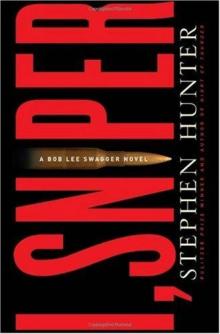 I, Sniper
I, Sniper Havana
Havana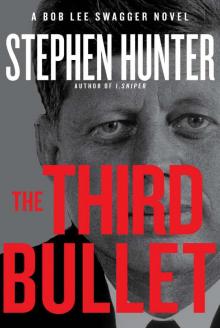 The Third Bullet
The Third Bullet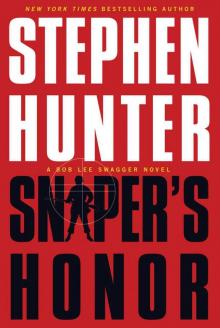 Sniper's Honor: A Bob Lee Swagger Novel
Sniper's Honor: A Bob Lee Swagger Novel Dirty White Boys
Dirty White Boys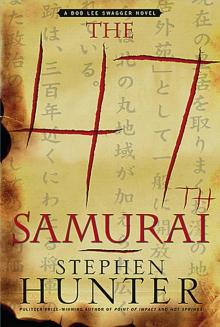 The 47th Samurai
The 47th Samurai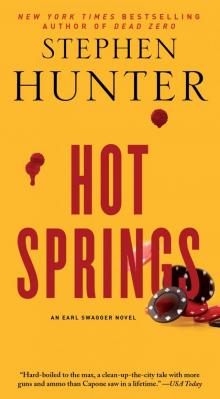 Hot Springs
Hot Springs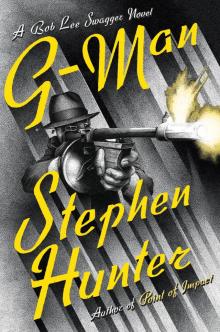 G-Man
G-Man Black Light
Black Light Time to Hunt
Time to Hunt The Day Before Midnight
The Day Before Midnight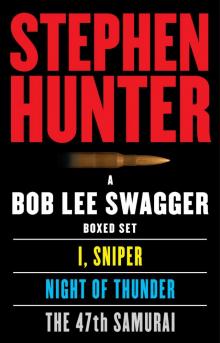 A Bob Lee Swagger Boxed Set
A Bob Lee Swagger Boxed Set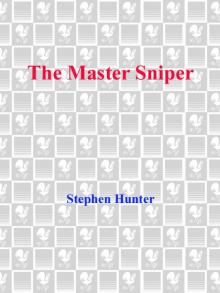 The Master Sniper
The Master Sniper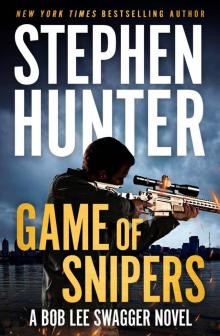 Game of Snipers
Game of Snipers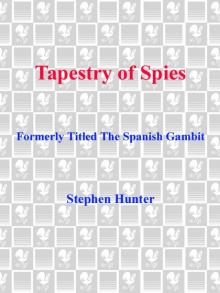 Tapestry of Spies
Tapestry of Spies Citadel
Citadel The Second Saladin
The Second Saladin Stephen Longacre's Greatest Match
Stephen Longacre's Greatest Match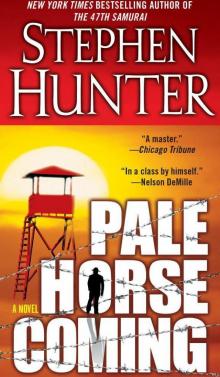 Pale Horse Coming
Pale Horse Coming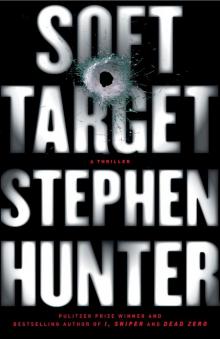 Soft Target
Soft Target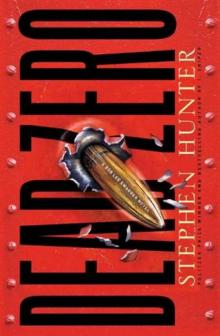 Dead Zero
Dead Zero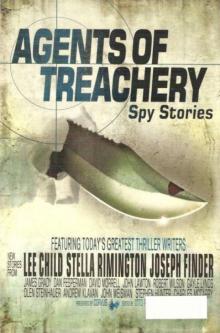 Casey at the Bat
Casey at the Bat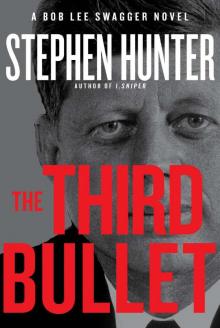 The Third Bullet bls-8
The Third Bullet bls-8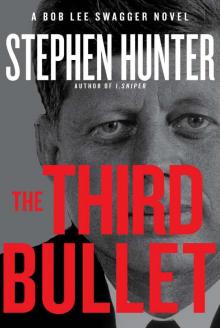 The Third Bullet: A Bob Lee Swagger Novel
The Third Bullet: A Bob Lee Swagger Novel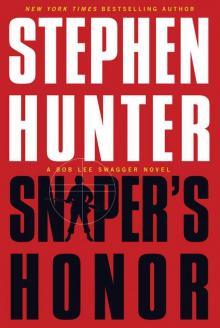 Sniper's Honor
Sniper's Honor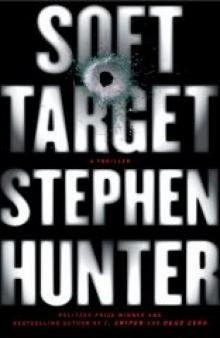 Soft target rc-1
Soft target rc-1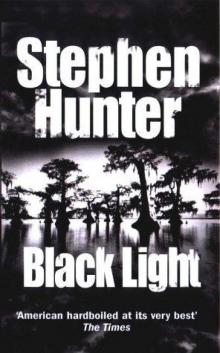 Black Light bls-2
Black Light bls-2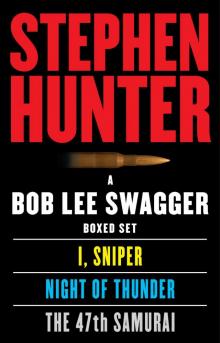 A Bob Lee Swagger eBook Boxed Set: I, Sniper, Night of Thunder, 47th Samurai
A Bob Lee Swagger eBook Boxed Set: I, Sniper, Night of Thunder, 47th Samurai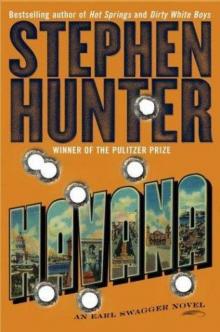 Havana es-3
Havana es-3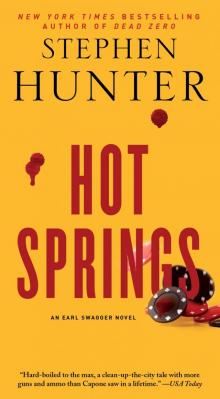 Hot Springs (Earl Swagger)
Hot Springs (Earl Swagger)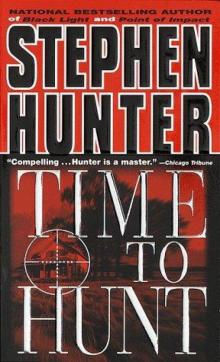 Time to Hunt bls-1
Time to Hunt bls-1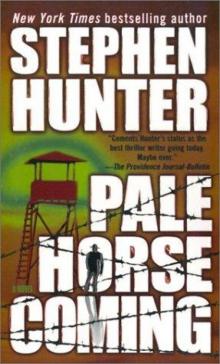 Pale Horse Coming es-2
Pale Horse Coming es-2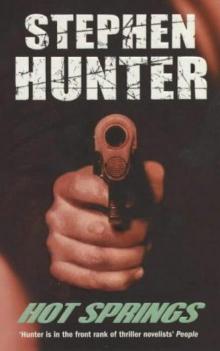 Hot Springs es-1
Hot Springs es-1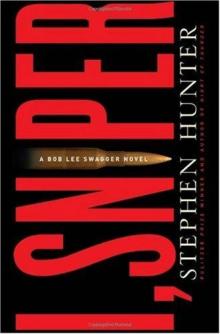 I, Sniper: A Bob Lee Swagger Novel
I, Sniper: A Bob Lee Swagger Novel